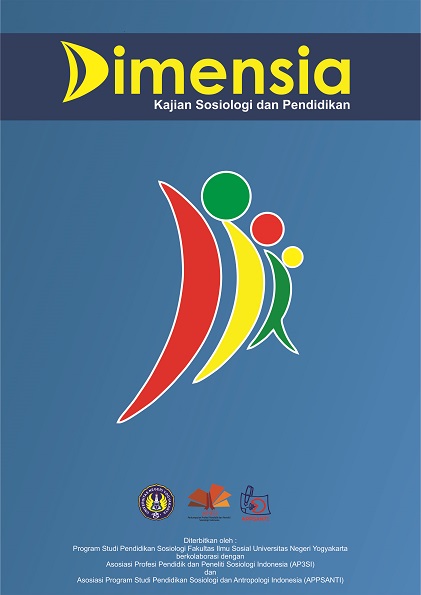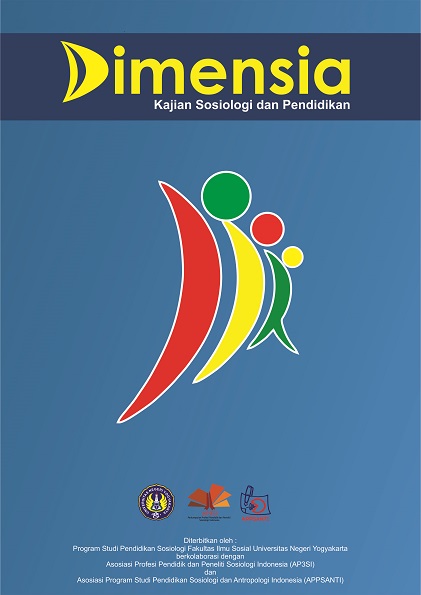Karakter, kepemimpinan dan kualitas guru: kajian kultur sekolah di Indonesia
DOI:
https://doi.org/10.21831/dimensia.v13i2.71874Keywords:
Sekolah, Kultur sekolah, Pendidikan Indonesia, Kebijakan Pendidika, Kualitas pendidikanAbstract
Studi ini merupakan rangkuman kajian tentang perkembangan penelitian tentang kultur sekolah di Indonesia. Kultur sekolah dipahami sebagai serangkaian nilai, sistem hinga artifak materiil dan non-materiil yang membentuk penyelenggaraan pendidikan di lingkungan sekolah secara menyeluruh. Kualitas pendidikan sekolah ditentukan oleh kultur sekolah yang terbangun. Kajian menggunakan pendekatan kualitatif deskriptif dan menganalisis judul-judul penelitian tentang budaya sekolah dari tahun 2015 hingga 2024. Hasil penelitian menunjukkan bahwa penelitian tentang budaya sekolah pada kurun waktu tersebut difokuskan pada empat aspek utama, yaitu: 1) budaya sekolah yang berkaitan dengan karakter dan perilaku siswa, 2) budaya sekolah yang berkaitan dengan kebijakan sekolah, 3) budaya sekolah yang berkaitan dengan kepemimpinan, dan 4) budaya sekolah yang berkaitan dengan kualitas guru.
This study provides a summary of research on school culture development in Indonesia. School culture encompasses a range of values, systems, and material and non-material elements that influence the implementation of education in the school environment. The quality of school education is contingent on the established school culture. The study adopts a descriptive qualitative approach and examines research titles on school culture from 2015 to 2024. The findings reveal that research on school culture during this period primarily focused on four main aspects: 1) school culture associated with student character and behavior, 2) school culture linked to school policies, 3) school culture connected to leadership, and 4) school culture correlated with teacher quality.
References
Aithal, P. S., S. K. (2016). Maintaining Teacher Quality In Higher Education Institutions. International Journal of Current Research and Modern Education (IJCRME) ISSN (Online): 2455 - 5428, I(I).
Arhipova, O., Kokina, I., & Michaelsson, A. R. (2021). School Principal's Management Competences For Successful School Development. Tiltai, 79(1).
Aung, P. N., & Hallinger, P. (2023). Research on sustainability leadership in higher education: a scoping review. In International Journal of Sustainability in Higher Education (Vol. 24, Issue 3).
Batra, P., Pillai, P., & Kaim, P. (2023). Quality Education from Teachers' Perspective. RESEARCH REVIEW International Journal of Multidisciplinary, 8(6).
Bhengu, T. T., & Mthembu, T. T. (2014). Effective Leadership, School Culture and School Effectiveness: A Case Study of Two "Sister" Schools in Umlazi Township. J Soc Sci, 38(1), 43–52
Budiatmi, A., & M. Entang, S. H. (2022). Teacher Quality Improvement by Reinforcing Organization Support, Training Effectiveness, and Collaboration in B-Accredited Private Elementary Schools in Bogor Regency. International Journal of Science and Management Studies (IJSMS).
Craig, I. (2021). Whatever happened to educational management? The case for reinstatement. Management in Education, 35(1), 52–57.
Deal, T. E & Peterson, K. D. (2009). Shaping school culture: pitfalls, paradoxes, and promises. New York, NY: Wiley
-------------------------------------. (2011). Shaping school culture: th heart of leadership. san frasisco: Jossey-Bass
Dimmock, C., Tan, C. Y., Nguyen, D., Tran, T. A., & Dinh, T. T. (2021). Implementing education system reform: Local adaptation in school reform of teaching and learning. International Journal of Educational Development, 80, 2-14.
DoÄŸan, M. (2017). Okul Kí¼ltí¼rí¼ ve Etkililik. Journal of Turkish Studies, 12(Volume 12 Issue 25), 253–264.
Efianingrum, A. 2013. Kultur sekolah. Jurnal Pemikiran Sosiologi. 2 (1) 19 – 30.
Gibson, Maznevski, & Kirman. (2010). Examining the impact of culture's consequences: a three-decade, multilevel, meta-analytic review of hofstede's cultural value dimensions. Journal of Applied Psychology. 95 (3), 405 – 439.
Hayat, K., Ihsan, M., & Tufail, N. (2023). A Study on School Leadership Effectiveness at Secondary Level in Punjab. Global Social Sciences Review, VIII(II), 101–107.
Ismail, M., Khatibi, A. A., & Ferdous Azam, S. M. (2022). Impact of School Culture on School Effectiveness in Government Schools in Maldives. Participatory Educational Research, 9(2), 261–279.
Jamaludin, U., Akbar, M., & Sumantri, M. S. (2019). Investment of Islamic Based Cultural Values in Learning Social Knowledge Science. International Journal of Multicultural and Multireligious Understanding, 6(4), 340.
Karadaǧ, E., Kilií§oǧlu, G., & Yilmaz, D. (2014). í–rgí¼tsel sinizm, okul kí¼ltí¼rí¼ ve okul baÅŸari{dotless}si{dotless}: Bir yapi{dotless}sal eÅŸitlik modelleme í§ali{dotless}ÅŸmasi{dotless}. Kuram ve Uygulamada Egitim Bilimleri, 14(1), 102–113.
Kurniawan, A. W., Kurniawan, R., & Sari, D. K. (2022). Exploring Student Attitudes during Physical Education Class. AL-ISHLAH: Jurnal Pendidikan, 14(3), 4579–4588.
Laihad, G. H., Hidayat, R., & Harijanto, S. (2023). Improving Teacher Quality with the Effectiveness of Training for Private Elementary School Teachers in Bogor District. Jurnal Multidisiplin Sahombu, 2(2).
Liu, Y., BellibaÅŸ, M. Åž., & Gí¼mí¼ÅŸ, S. (2021). The Effect of Instructional Leadership and Distributed Leadership on Teacher Self-efficacy and Job Satisfaction: Mediating Roles of Supportive School Culture and Teacher Collaboration. Educational Management Administration and Leadership, 49(3), 430–453.
Manaf, A., Mohd, C., Bin, Z., & Omar, C. (2017). Improvement School Effectiveness through Culture and School Climate. The International Journal of Social Sciences and Humanities Invention, 4(2), 3289–3298.
Ozan, M. B & Demir, Canan. (2012). The perception levels of theachers and students related to school culture metaphors according to different types of high schools. International Journal of Human Sciences. 9 (2), 831 – 846
Pervez, Z. Dahar, M. A., & Maryam, A. (2017). Impact of school culture on student's academic achievement at secondary level, Sci.Int.(Lahore), 29(3), 565-568.
Peterson, K. (n.d.). The Professional Development of Principals: Innovations and Opportunities "Ensuring Universities'' Capacity to Prepare Learning Focused Leadership"."
Qingyan, G., Azar, A. S., & Ahmad, A. (2023). The Impact of Teacher Quality Management on Student Performance in the Education Sector: Literature Review. In World Journal of English Language (Vol. 13, Issue 3).
RecepoÄŸlu, E. (2013). The Significance of Assumptions Underlying School Culture in the Process of Change. www.soeagra.com/ijert/ijert.htm
Sabancı, A., Åžahin, A., Sí¶nmez, M.A. & Yılmaz, O. (2017). Views of School Managers and Teachers about School Culture, E-International Journal of Educational Research, Vol: 8, No: 1, 2017, pp. 28-45
Sarghini, A., Talebi, B., & Hoseinzade, O. (2023). Elements of the educational policy model in schools (a systematic review). Journal of Education and Health Promotion, 12(1).
Schein, E. (2004). Organisational Culture and Leadership (3rd ed.). San Francisco: JosseyBass
Sharma, P. (2015). Standards-based assessments in the classroom: A feasible approach to improving the quality of students' learning. Contemporary Education Dialogue, 12(1).
Sudrajat, A. (2011). Mengapa pendidikan karakter. Jurnal Pendidikan Karakter. 1 (1).
Sufean, H. (2014). School culture and instructional leadership of high-performing and low-performing school: pattern of variation and relationship. Journal Of Humanities And Social Science
Utama, U. P. (2021). The Role Of School Culture In Improving Students Character Titim Eliawati. In Jurnal Inovasi Pendidikan Kejuruan (Vol. 101, Issue 3).
Williams, N. J., Hugh, M. L., Cooney, D. J., Worley, J. A., & Locke, J. (2022). Testing a Theory of Implementation Leadership and Climate Across Autism Evidence-Based Interventions of Varying Complexity. Behavior Therapy, 53(5).
Yılmaz, E. ; (2017). Views of School Managers and Teachers about School Culture. E-International Journal of Educational Research, 8(1x), 28–45.
Yusro, M. 2023. Peringkat Sistem Pendidikan Dunia 2023, Indonesia ke 67 dari 203 Negara. https://www.myusro.id/?p=1993 diakses pada Jumat 28 Juni 2024: 09.23
Zamroni/ (2007). Pendidikan dan demokrasi dalam transisi. Jakarta: PSAP Muhammadiyah
Zamroni. (2016). Kultur sekolah. Yogyakarta: Gavin Kalam Utama
Downloads
Published
How to Cite
Issue
Section
License
Penulis yang menerbitkan jurnal ini menyetujui ketentuan berikut:
- Penulis memegang hak cipta dan memberikan hak publikasi pertama kepada jurnal dengan karya tersebut secara bersamaan dilisensikan di bawah Lisensi Atribusi Creative Commons yang memungkinkan orang lain untuk berbagi karya dengan pengakuan atas kepenulisan karya dan publikasi awal di jurnal ini.
- Penulis dapat mengadakan perjanjian kontrak tambahan yang terpisah untuk distribusi non-eksklusif dari karya versi terbitan jurnal (misalnya, mempostingnya ke repositori institusi atau menerbitkannya dalam buku), dengan pengakuan atas publikasi awalnya pada tahun jurnal ini.
- Penulis diizinkan dan didorong untuk memposting karya mereka secara online (misalnya, di repositori institusi atau di situs web mereka) sebelum dan selama proses penyerahan, karena hal ini dapat mengarah pada pertukaran yang produktif, serta kutipan karya yang diterbitkan lebih awal dan lebih banyak (Lihat The Pengaruh Akses Terbuka).
====================================================
Authors who publish with this journal agree to the following terms:
- Authors retain copyright and grant the journal right of first publication with the work simultaneously licensed under a Creative Commons Attribution License that allows others to share the work with an acknowledgement of the work's authorship and initial publication in this journal.
- Authors are able to enter into separate, additional contractual arrangements for the non-exclusive distribution of the journal's published version of the work (e.g., post it to an institutional repository or publish it in a book), with an acknowledgement of its initial publication in this journal.
- Authors are permitted and encouraged to post their work online (e.g., in institutional repositories or on their website) prior to and during the submission process, as it can lead to productive exchanges, as well as earlier and greater citation of published work (See The Effect of Open Access).








